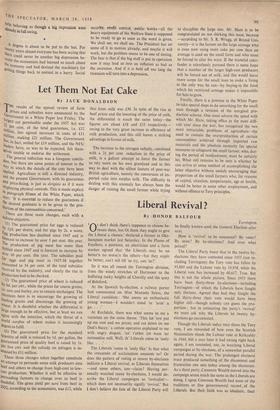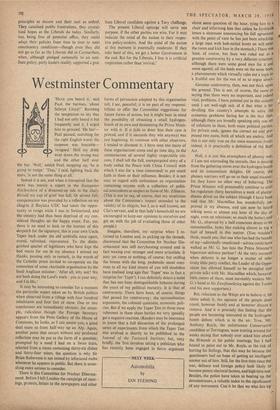Liberal Revival?
BALFOUR By .HONOR ',"%i don't think there's tuppence to choose be- tween them, but Oi think they ought to give the Liberal a chance,' declared a farmer in Oke- hampton market last Saturday. In the Plume of Feathers, a postman, an electrician and a farm worker agreed that 'the Liberals may be no better'n no worse'n the others—but they might be better; can't tell till 'ee try, can 'ee?'
So it was all round the Torrington division, from the windy• stretches of Dartmoor to the buffeting rocky heights of Clovelly and the quay of Bideford.
At the Ipswich by-election, a railway porter had commented on Miss Manuela Sykes, the Liberal candidate: 'She seems an enthusiastic young woman—I wouldn't mind 'er 'avin' a go. . .
At Rochdale, there was what seems to me a variation on the same theme. 'This lot 'ave put up me rent and me prices, and cut down on me Dad's baccy,' a cotton operative explained to me with angry disgust, 'an' t'other lot want ter nationalise mill. Well, th' Liberals come in 'andy. like. . .
The Liberals `come in 'andy like.' Is that what the crescendo of acclamation amounts to? Or does the pattern of voting at recent by-elections indicate a Liberal revival, as Liberals themselves —and some others, too—claim? Having per- sonally watched many by-elections, I would de- scribe the Liberal campaigns as 'revivalist'— which does not necessarily signify 'revival.' But I don't believe the fate of the Liberal Party will Torrington be finally known until the General Election after next.
How is 'revival' to be measured? By votes? By seats? By by-elections? And over what period?
The Liberal Party boast that in the twelve by- elections they have contested since 1955 (not in- cluding Torrington) the Tory vote has fallen by 95,869 and the Labour vote by 19,958, while the Liberal vote has increased by 60,617. True. But this is not the whole picture. Since 1955 there have been thirty-three by-elections—including Torrington—of which the Liberals have fought only thirteen. Agreed that had they fought the full thirty-three their vote would haVe been higher still—though nobody can guess the pro- portion : but in estimating the party's 'revival' We must ask why, the Liberals let twenty by- elections go uncontested.
Though the Liberals today may share the Tory vote, I am reminded of how even the Scottish Nationalists shook the. Labour vote at Kirkcaldy in 1944, but a year later it had swung right back again. I am reminded, too, in watching Liberal campaigns at by-elections, of a somewhat parallel period during the war. The prolonged electoral truce produced something of, the discontent and frustration one sees today among the electorate. As a third party, Common Wealth moved into the campaign arena much the same as the Liberals are doing. I agree Common Wealth had none of the traditions or fine governmental record., of the Liberals. But their faith was as idealistic, their principles as sincere and their zeal as ardent. They canalised public frustrations, they crystal- lised hopes as the Liberals do today. Similarly, too, being free of potential office, they could adapt their policies from time to time to meet constituency conditions—though even they did not go as far as the Liberals did in Carmarthen, when, although pledged nationally to an anti- Suez policy, party leaders readily supported a pro- Suez Liberal candidate against a Tory challenge.
The present Liberal upsurge will serve one purpose, if the other parties are wise. For it may indicate the mind of the nation to their respec- tive policy-makers. And the mind of the nation at this moment is essentially moderate. If they take heed of this, we get a better Government in the end. But for the Liberals, 1 fear it is artificial respiration rather than 'revival.'











































 Previous page
Previous page